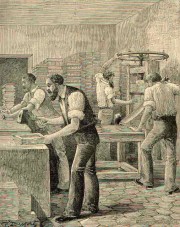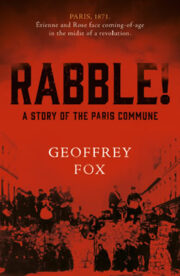Podcast:
Book discussion about the Paris Commune
with guest Geoffrey Fox – Podcast
Interview:
Interview of Geoffrey Fox on the writing of Rabble! (page 54)
Reviews and comments:
Reviews posted in Goodreads, Amazon and NetGalley
Other reader comments
What drives youth to believe that they can and must change the world, no matter how great the sacrifice? And how does their struggle change them? And, no less important, how do the conditions of labor — the hours spent, the wages and the relationship with the owner and manager, the comradeship, the motions and skills required — shape the political and social thought of the laborers?

La Commune de Paris, 1871. Une barricade au coin des rues Basfroid et de Charonne, le 18 mars 1871.
The story

Bookbinders at work, Paris, 1870s
In 1870, 17-year-old apprentice bookbinder Étienne Bonin travels from revolutionary Lyon to even more revolutionary Paris seeking excitement and professional opportunity, and by the spring of 1871 is deeply committed to the insurrection for workers’ power, a new lover — Rose, 16-year-old coworker and budding feminist from Belleville—and also to his new comrades. He and she and their comrades, men and women, experience festive celebrations, institutional innovations, and military disasters until the final “week of blood.”
Étienne and Rose’s coming of age together in the midst of a revolution is like many stories of revolt and destruction today. It also the story of the growth of a powerful working-class movement, all the tradesmen and women involved in creating and defending the Paris Commune of 1871: not just bookbinders, but also bronze workers, tin smiths, shoemakers, typographers, printers, laundresses, clothing and textile workers, carpenters… etc.
“Rabble” is the closest English equivalent for canaille, the term the privileged classes used to scorn the rough and ready workers who had seized the city and were remaking it as a bastion of liberty, equality and fraternity. Those tradesmen and women, the “rabble/canaille”, created the first self-governing, proto-communist society in the modern world, in what was then the European continent’s largest and most prestigious capitalist center. And to defend it against massive bombardment and infantry attacks for over two months, which would finally annihilate the Commune but not its ideals, which would be reborn in revolutions from 1917 to our day.
